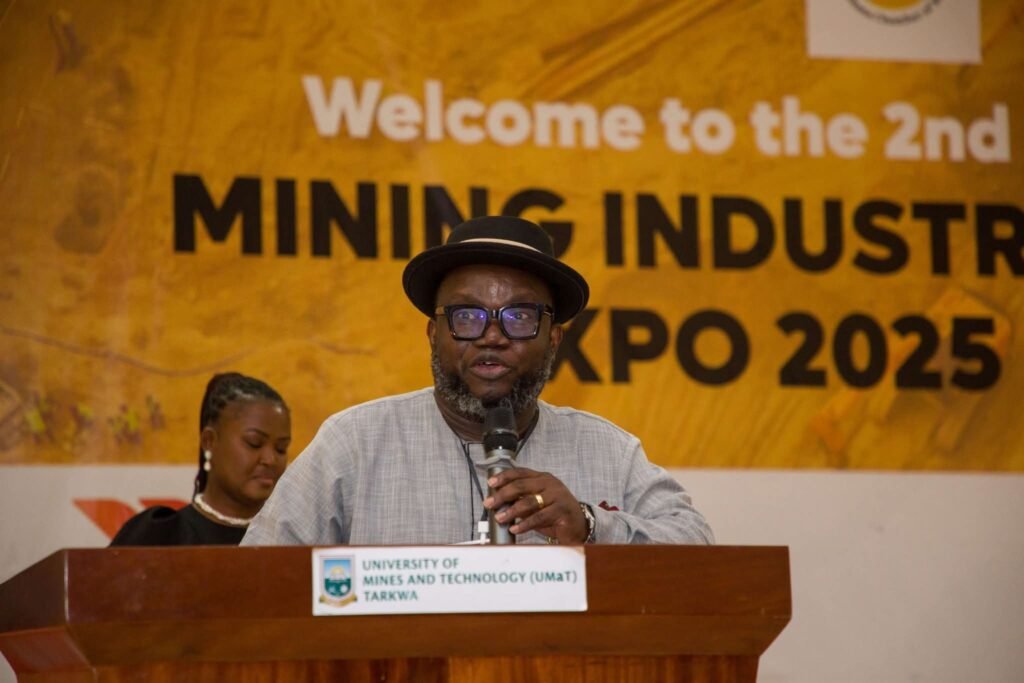The Chief Executive Officer of the Ghana Chamber of Mines, Ing. Dr. Kenneth Ashigbey, has called for a bold transformation of Ghana’s mining sector from a procurement-based local content model to a manufacturing-driven one.
He emphasized that the time has come for the country to use its mining industry as an engine for large-scale industrialisation and job creation.
Speaking at the opening ceremony of the 2025 Mining Industry Marketing Expo (MIME) at the University of Mines and Technology (UMaT) in Tarkwa, Dr. Ashigbey said Ghana has made remarkable gains in mining over the last decade.
However, he stressed that the next phase of growth must focus on converting mining demand into domestic industrial capacity.
“Our mining sector has achieved significant economic milestones, but to sustain progress, we must turn the market opportunities within mining into platforms for manufacturing, innovation, and export.”
Ing. Dr. Kenneth Ashigbey, the Chief Executive Officer of the Ghana Chamber of Mines
Mining Sector Showing Strong Local Procurement Growth

Drawing on recent data from the Minerals Commission, Dr. Ashigbey revealed that mining companies spent approximately US$3.5 billion on goods and services in 2024, representing more than 49% of mineral revenue spent locally.
The Chamber’s own records confirmed the figure, noting that producing members also contributed GHS 17.68 billion in taxes and levies, alongside over US$28 million in corporate social investments that year.
He described the performance as evidence of steady progress in local participation. “The trajectory is unmistakable: Ghana is buying more from Ghana,” he remarked, highlighting that local procurement had grown consistently from US$1.89 billion in 2021 to US$2.03 billion in 2022 and US$2.4 billion in 2023.
Despite this upward trend, the Chamber of Mines CEO cautioned that local content efforts must evolve beyond purchasing goods within Ghana.
“Buying bolts and overalls locally is a start; building the factories and technical capabilities to manufacture those bolts and stitch those overalls at scale, competitively, and to export standards is the destination.”
Ing. Dr. Kenneth Ashigbey, the Chief Executive Officer of the Ghana Chamber of Mines
Dr. Ashigbey emphasized that mining should serve as a catalyst for industrialisation, not just as a source of export revenue.
He argued that Ghana’s mining sector can play a transformative role in creating a domestic manufacturing base that supplies high-quality inputs to both local and international markets.
“The conversation must move from procurement to production. We cannot continue importing what we have the capacity to make.
“The next chapter of Ghana’s mining story must be about factories, foundries, and fabrication plants built right here.”
Ing. Dr. Kenneth Ashigbey, the Chief Executive Officer of the Ghana Chamber of Mines
He called for a three-pronged strategy to accelerate this shift: scaling up the production of high-value components such as valves, steel parts, HDPE piping, and chemical reagents; strengthening the financing and testing ecosystem to help Ghanaian firms meet global standards; and expanding technical training and apprenticeships to build a skilled workforce capable of handling complex manufacturing and maintenance work.
“Partnerships among entrepreneurs, financiers, academia, and global technology holders are crucial if Ghana is to develop a competitive mining-equipment manufacturing industry.”
Ing. Dr. Kenneth Ashigbey, the Chief Executive Officer of the Ghana Chamber of Mines
Strengthening Institutions and Financial Systems

The Chamber of Mines CEO also highlighted the sector’s broader contribution to Ghana’s economic stability.
He disclosed that mining companies repatriated US$4.99 billion through the Bank of Ghana and commercial banks in 2024, a move that supported foreign exchange liquidity.
Additionally, mining firms sold 358,218 ounces of gold to the central bank to help strengthen Ghana’s international reserves. “These figures underscore how responsible mining strengthens Ghana’s financial system,” Dr. Ashigbey noted.
He added that the mining industry continues to be a reliable pillar of fiscal stability, supporting the government’s developmental agenda through both direct contributions and indirect economic activity.
MIME 2025: Building Connections for Growth

Describing the Mining Industry Marketing Expo (MIME) as a critical engagement platform, Dr. Ashigbey said the event was designed to connect mining companies with suppliers while showcasing innovations that promote local capacity building.
Held under the theme “Sustainable Mining Through Local Manufacturing and Innovation,” MIME 2025 brings together key stakeholders from across the mining value chain including manufacturers, service providers, and financial institutions.
He said the Chamber views the expo as a platform to foster collaboration and knowledge exchange that can accelerate industrial growth.
“The Chamber stands ready to work with government, academia, civil society, and private partners to convert policy into factories, contracts into careers, and mineral revenue into made-in-Ghana industrial strength.”
Ing. Dr. Kenneth Ashigbey, the Chief Executive Officer of the Ghana Chamber of Mines
The Chamber CEO reiterated that Ghana must redefine its mining success not merely by export earnings, but by the depth of value addition and industrial capacity created locally.
He called for coordinated action among all stakeholders to ensure that mining catalyzes the broader industrial transformation of the Ghanaian economy.
READ ALSO: Ato Forson Promises Renewed Investment for Benso Oil Palm Plantation























